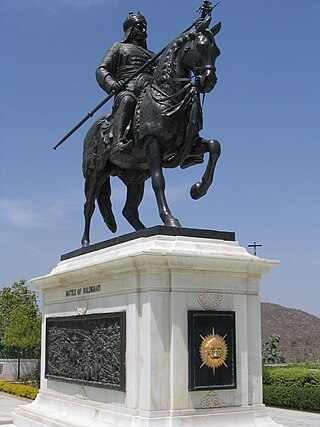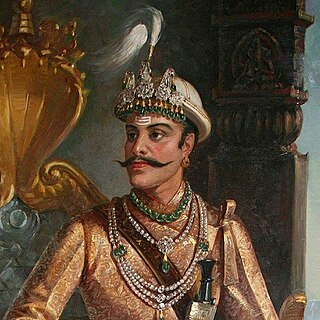
Nasir al-Din Muhammad, commonly known by his regnal name Humayun, was the second Mughal emperor, who ruled over territory in what is now Eastern Afghanistan, Bangladesh, Northern India, and Pakistan from 1530 to 1540 and again from 1555 to his death in 1556. At the time of his death, the Mughal Empire spanned almost one million square kilometers.

Bhimsen Thapa was a Nepalese statesman who served as the Mukhtiyar and de facto ruler of Nepal from 1806 to 1837. He is widely known as the longest-serving prime minister of Nepal and was inducted into the "National heroes of Nepal" by King Mahendra Bir Bikram Shah.
The Sisodia was an Indian royal dynasty belonging to the clan that ruled over the Kingdom of Mewar, in the region of Mewar in Rajasthan. The name of the clan is also transliterated as Sesodia, Shishodia, Sishodia, Shishodya, Sisodya, Sisodiya, Sisodia.

Qutb-ud-Din Bahadur Shah, born Bahadur Khan was a sultan of the Muzaffarid dynasty who reigned over the Gujarat Sultanate, a late medieval kingdom in India from 1526 to 1535 and again from 1536 to 1537. He ascended to the throne after competing with his brothers. He expanded his kingdom and made expeditions to help neighbouring kingdoms. In 1532, Gujarat came under attack of the Mughal Emperor Humayun and fell. Bahadur Shah regained the kingdom in 1536 but he was killed by the Portuguese on board a ship when making a deal with them.

The prime minister of Nepal is the head of government of Nepal. Together with their Council of ministers, The prime minister exercises executive power in the country. The prime minister must enjoy the confidence in the Pratinidhi Sabha before being appointed by the president and shall resign if they are unable to retain the majority in the House.

Rao Maldeo Rathore was a king of the Rathore dynasty, who ruled the kingdom of Marwar in present day state of Rajasthan. Maldeo ascended the throne in 1531 CE, inheriting a small ancestral principality of Rathore's but after a long period of military actions against his neighbours, Maldeo swept significant territories which included parts of present day Rajasthan, Haryana, Uttar Pradesh, Gujarat and Sindh. He refused to ally with either the Sur Empire or the Mughal Empire.

Amarkot is a city in the Sindh province of Pakistan. The Mughal emperor Akbar was born in Umerkot in 1542. The Hindu folk deities Pabuji and Ramdev married in Umerkot.

Rana is an historical title denoting an absolute Hindu king in the Indian subcontinent. Today, it is used as a hereditary name in the Indian subcontinent. "Rana" was formerly used as a title of martial sovereignty by Rajput kings in India. Rani is the title for the wife of a rana or a female monarch. It also applies to the wife of a raja. Compound titles include rana sahib, ranaji, raj rana,rana bahadur, and maharana.

Rana Bahadur Shah, King of Nepal was King of Nepal, he succeeded to the throne after the death of his father, King Pratap Singh Shah. He ruled under the regencies of his mother, Queen Rajendra Rajya Lakshmi Devi, and then of his uncle, Bahadur Shah. During this time, the kingdom was expanded by conquest to include the Garhwal and Kumaon regions, now part of India. He imprisoned his uncle, Bahadur Shah, who died in jail.

The Kingdom of Amber, later the Kingdom of Jaipur or the Jaipur State, was located in the north-eastern historic Dhundhar region of Rajputana and was ruled by the Kachwaha Rajput clan. It was established by Dulha Rai, possibly the last ruler of the Kachchhapaghata dynasty of Gwalior who migrated to Dausa and started his kingdom there with the support of Chahamanas of Shakambhari in the 12th century. Mostly through 12th to 15th century, the kingdom faced stagnation, sources were scarce. Under its ruler, Raja Chandrasen of Amber became a Sisodia vassal and fought in the Battle of Khanwa under Raja Prithviraj Kachhwaha.
Udai Singh II was the 12th Maharana of the Kingdom of Mewar and the founder of the city of Udaipur in the present-day state of Rajasthan, India. He was the fourth son of Rana Sanga and Rani Karnavati, a princess of Bundi.

The Kingdom of Mewar was an independent kingdom that existed in the Rajputana region of the Indian subcontinent and later became a major power in medieval India. The kingdom was initially founded and ruled by the Guhila dynasty followed by the Sisodiya Dynasty. The kingdom came to be known as the Udaipur State after it became a princely state in the nineteenth century.

Kingdom of Marwar also known as Jodhpur State during the modern era, was a kingdom in the Marwar region from 1243 to 1818 and a princely state under British rule from 1818 to 1947. It was established in Pali by Rao Siha, possibly a migrant Gahadavala noble, in 1243. His successors continued to struggle against regional powers for domination and 9 out of 15 rulers till 1438 died in combat. In 1395, its capital was changed to Mandore by Rao Chunda of Mandore and to Jodhpur in 1459 by Rao Jodha.
Rana Chandra Singh, also known as Rana Chandar Singh, was a Pakistani politician and a federal minister. He was one of the founding members of the Pakistan Peoples Party (PPP) and was elected to the National Assembly of Pakistan from Umerkot seven times with PPP between 1977 and 1999. He founded the Pakistan Hindu Party (PHP) in 1990.

Umarkot Fort, also called Amarkot, is a fort in Umerkot, Sindh. Emperor Akbar was born in Umarkot Fort when his father Humayun fled from the military defeats at the hands of Sher Shah Suri on 15 October 1542. Rana Prasad Singh Sodha of Umarkot, who had risen to power, had given refuge to Mughal Emperor Humayun, and it was there that Hamida Bano Begum gave birth to young Akbar. Later the Mughal Emperor Akbar became the Shahenshah of Hindustan and was a popular figure with both Hindus and Muslims. Umerkot has many sites of historical significance such as Mughal emperor Akbar's birthplace near to Umarkot Fort. Currently, Akbar's birthplace is an open land. In 1746, the Mughal Subahdar, Noor Mohammad Kalhoro, built a fort at the location. Later the British took over that area.

The Thari also known as the Dhatti are an Indo-Aryan ethno-linguistic group who reside in the Thar Desert, which is divided between Pakistan and India. They speak Thari, also known as Dhatki language. Thari is also a geographical term, it refers to anything which belong or come from Thar desert. The Thari people live primarily in Tharparkar district of Sindh in Pakistan. In India, Thari speakers are found in western parts of Rajasthan.

Rana Hamir Singh is a Pakistani politician who had been a member of Provincial Assembly of Sindh from August 2018 to August 2023. He is one of the five children of Rana Chandra Singh. He is also titled as 'Rana Saheb'.
Delwara, nestled in the Aravalli Range hills, is a small town about 28 km away from Udaipur, Mewar, and close to Eklingji Temple, on the way to the temple town of Nathdwara, in the state of Rajasthan, India. Delwara was originally known as ‘Devkul Patan Nagri’, which means the town of god. It boasted over 1500 temples at one time, out of which there were over 400 Jain temples. Delwara was the center of learning and culture before the 15th century AD. Around the middle of the 13th century, Raja Sagar, a Deora Chauhan and a descendant of Rao Kirtipal of Jalore, was a very brave king of Delwara (Mewar). Descendants of Raja Sagar sacrificed their lives while fighting alongside Ranas of Mewar against Muslim invaders. Raja Sagar was the progenitor of Bachhawat and Bothra clans of Oswals. Sagar's son, Kunwar Bohitya was immensely influenced and inspired by Jain philosophy. Samdhar, a grandson of Bohitya and a Deora Chauhan, was the first man in his genealogy to convert to Jainism.
Sodha is a Rajput clan residing in India and Pakistan.
The Sodhas of Amarkot were a Rajput dynasty who ruled Amarkot, which is now located in the Sindh province of Pakistan. The Sodha Rajput clan are a branch of the Parmar clan of Rajputs, as they are an off-shoot of Parmara Rajputs, who once controlled regions of Malwa and later North-West parts of Rajasthan. The kingdom was known for giving refuge to Mughal emperor Humayun, after he was fleeing from the forces of Sher Shah Suri, hence Akbar was born in the kingdom of Amarkot.












